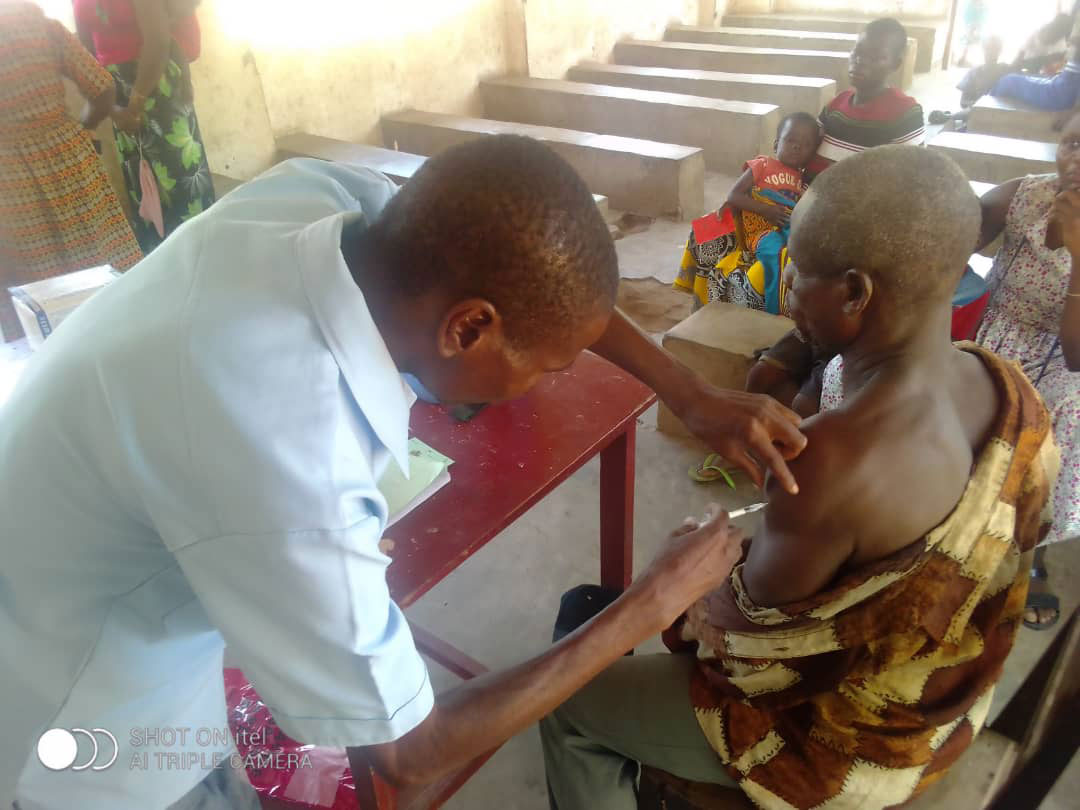Malawi in 60-day COVID-19 “vaccine express” drive
Malawi’s Ministry of Health has embarked on a two months vaccination express campaign to drive uptake and take vaccines to the people.
- 14 December 2021
- 5 min read
- by Josephine Chinele

Earlier this year Malawi’s Ministry of Health embarked on a mini door-to-door vaccination drive, taking the vaccines to the people to boost coverage in certain areas. The project worked, and following the success of this mini-campaign, the ministry has now launched a 60-day COVID-19 “vaccine express” campaign across the country.
“This campaign is about taking vaccine to where the people are, including the markets, workplaces, and places of worship.”
The ministry has hired trucks and minibuses deployed across all districts of the country to make it easier for teams of district health officials to move around the communities. These teams, which comprise Health Surveillance Assistants (HSAs), vaccinators from the District Health Office and social mobilisers, travel in mobile vans (marked “Express Van”) with a public address system, accompanied by a drama group.
Their work is to raise awareness on the vaccines, interact with communities who might have questions about the vaccine and administer free jabs in their communities.
The Ministry believes that there has been low uptake and high hesitancy due to long distances to the vaccination sites and limited knowledge about the COVID-19 vaccine, among other issues.
“I wouldn’t have received the vaccine if not for this initiative. Health facilities are very far from here. I hope our district health office continues with this initiative in order to reach many people, because we have common problems,” says Christopher Msiyambiri of Medramu Village, Traditional Authority Mulilima in Chikwawa district, located in Southern Malawi. He received the AstraZeneca vaccine and will have his second jab on 23 February 2022.
In Malawi, it’s always been a luxury to go for a check-up when you show no signs of sickness. This reality has had an impact on people’s capacity to travel to receive the COVID-19 jab. For example, in the case of Msiyambiri’s community, they would use a motorcycle taxi, which would cost a minimum of MK 1,400 (US$ 1.70) return fare, which is a lot of money by village standards.

Picture credit: Chikwawa DHO
Group village headman Medramu applauds the ministry for coming up with the initiative, saying people have a lot of personal problems and a vaccine would be the last thing to consider.
“People are living in poverty. Their priority is finding food for their households and making ends meet. The initial vaccine centre was very far, which resulted in many people remaining unvaccinated. But, when they came here, many people received the jab. They even go as far as vaccinating the elderly and others in their homes.”
Have you read?
Health Promotion Officer for Chikwawa DHO, Settie Piriminta says the campaign has improved COVID-19 vaccine uptake in the district. “I know that others hesitated to get jabbed because they didn’t have the right information, but, through these campaigns, we have given them information and an opportunity to share their fears and learn more. This has worked wonders.”
Piriminta reinforces the thought that the distances to approved vaccination sites also hampered the process, saying, “They might have been willing to have the jab, but failed due to long distances. We are taking the vaccines to further remote areas.”
Each COVID-19 Vaccine Express Van team works with traditional leaders, which enables the health workers to do door-to-door vaccinations, whether at home or at the workplace.
The Express team does not carry vaccines from the district point. Instead, they collect vaccines from the health facility that is nearest to where their campaign activity will take place on that particular day. All health facilities follow the same cold chain measures for the COVID-19 vaccine storage and administration, which are used for other vaccines. All vaccines are stored at temperatures of between two and eight degrees Celsius.
Piriminta adds, ”When it comes to specific vaccines, we decide on which to administer depending on what is available (i.e., Johnson & Johnson or AstraZeneca) and the lifespan of the batches.”
Health Expert at Prime Health Consulting and Services, Professor Maureen Chirwa believes the campaign is timely and has a high likelihood of reaching the targets. “When the vaccines were launched, there was no provision for the elderly to get to the vaccination sites. Only those who were able to carry their elderly to the sites had them vaccinated and, therefore, only a few elderly received the jab. This campaign gives an opportunity to those that weren’t able to get to the sites to receive it in their own homes,” she says.
Professor Chirwa, however, also urges all to commit to making the campaign as success. “I assume that the authorities have properly planned both in terms of vaccines and personnel and that the personnel have been properly trained. Punctuality, for example, is something that can make or break a campaign such as this. If the teams are punctual and consistent in setting their work sites over the 60 days, things are going to work. I also encourage the community to keep an open mind. It’s only when everybody is vaccinated that we can all talk about moving towards being safe.”
Ministry of Health spokesperson, Adrian Chikumbe says, “This campaign is about taking vaccine to where the people are, including the markets, workplaces, and places of worship. We have been liaising with traditional and other leaders to ensure that everyone has access and to ensure that we administer all vaccine doses that we receive.”
As of 9 December 2021, Malawi had a total fully vaccinated population of 624,598.
More from Josephine Chinele
Recommended for you








